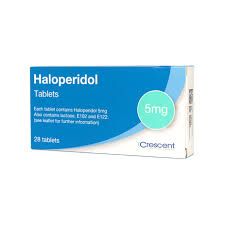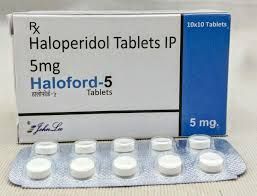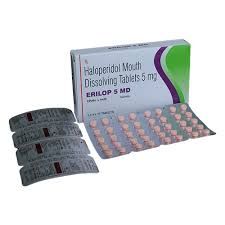Haloperidol is an antipsychotic medication primarily used to treat various mental health disorders, including schizophrenia, acute psychosis, and severe behavioral problems in children. It is also effective in managing tics associated with Tourette syndrome.
Key Features
- Generic Name: Haloperidol
- Strength: 5 mg per tablet
- Formulation: Available as oral tablets, as well as in liquid and injectable forms.
Indications
Haloperidol is indicated for:
- Schizophrenia: Helps manage symptoms of psychosis.
- Tourette Syndrome: Controls motor and vocal tics.
- Severe Behavioral Disorders: Used in children exhibiting explosive behavior or hyperactivity when other treatments have failed.
- Acute Psychosis: Provides short-term management of severe agitation.
Mechanism of Action
Haloperidol works by blocking dopamine receptors in the brain, particularly D2 receptors. This action helps reduce abnormal excitement and restores balance to neurotransmitters, which can alleviate symptoms of psychosis and agitation.
Dosage and Administration
- Recommended Dosage:
- Adults: The typical starting dose is often between 0.5 mg to 2 mg, taken two to three times daily. The dosage may be adjusted based on the patient's response and tolerance.
- Children: Dosage should be determined by a healthcare provider based on the child's specific condition and needs.
- Administration Instructions:
- Take the tablets with water, with or without food, as directed by your healthcare provider.
- Consistency in timing (e.g., taking at the same times each day) is important for optimal effectiveness.
Side Effects
Common side effects may include:
- Drowsiness or sedation
- Dry mouth
- Constipation
- Blurred vision
Serious side effects can include:
- Tardive dyskinesia (involuntary movements)
- Extrapyramidal symptoms (e.g., tremors, rigidity)
- Increased risk of cardiovascular issues, particularly in older adults.
There is also a black box warning for increased mortality risk in elderly patients with dementia-related psychosis.
Precautions
- Contraindications: Not suitable for individuals with known hypersensitivity to haloperidol or those with certain conditions such as Parkinson's disease or severe depression.
- Pregnancy and Breastfeeding: Consult a healthcare provider before use; the safety during pregnancy has not been established.
- Drug Interactions: Inform your healthcare provider about any other medications being taken to avoid potential interactions, especially with other CNS depressants.





